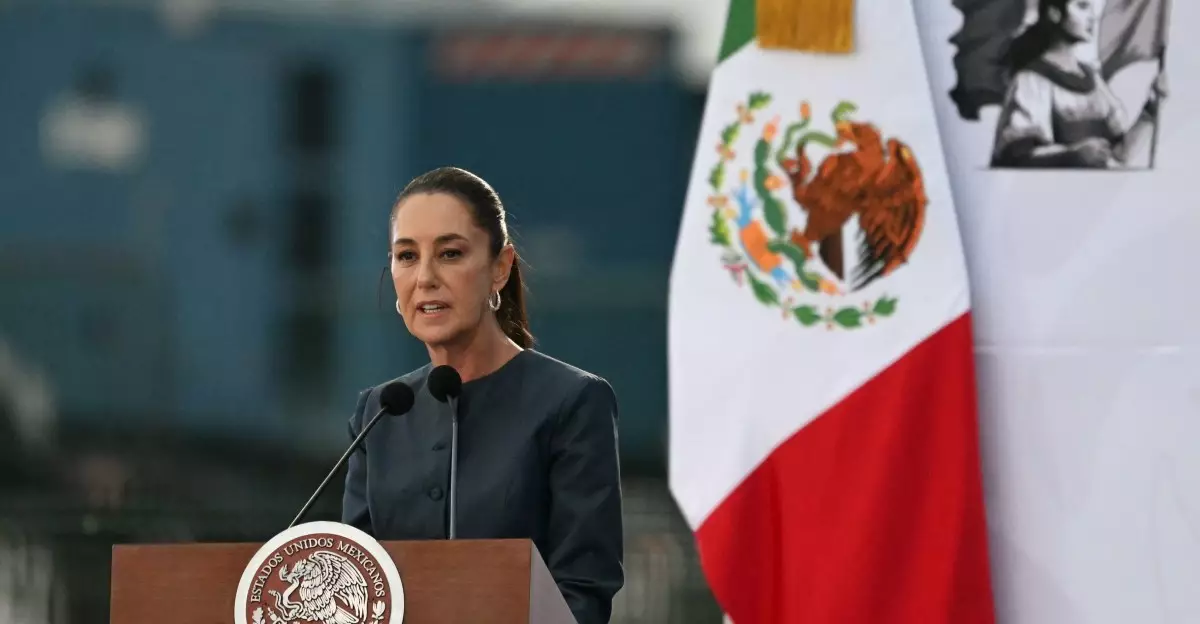In a striking clash of international significance, the Gulf of Mexico finds itself submerged in a tempest of political maneuvering and technological oversight. Mexican President Claudia Sheinbaum has recently announced that her administration is taking legal action against Google, following the tech giant’s redirection of the Gulf’s name to “Gulf of America” for its U.S. users. This move, orchestrated against the backdrop of President Trump’s early tenure, has ignited tensions that tread deeply into issues of sovereignty, identity, and geographical integrity.
The naming of the Gulf is more than just a cultural detail or geographical label; it is entwined with historical significance and national pride. Sheinbaum’s lawsuit reflects not only a desire for adherence to international naming conventions but also serves as a reminder of the cultural legacies that such nomenclature carries. The U.S. government’s unilateral action to redefine the Gulf stretches beyond mere semantics; it signifies a broader strategy of asserting territorial and cultural authority, a motif often manifest in America’s foreign policy.
Google’s Complicated Position
Google, a company that prides itself on being interconnected with global narratives, finds itself in a precarious position as it navigates this geopolitical quagmire. The company complied early with the Trump administration’s directive, modifying its map applications to reflect the new terminologies. This compliance raises questions about corporate responsibility and the extent to which a tech company should engage with the political leanings of any given administration.
While some might argue that a private enterprise such as Google should remain politically neutral, Sheinbaum’s administration contends that allowing these changes to persist undermines Mexico’s sovereignty over its territorial waters. The decision to label parts of the Gulf under U.S. dominion as “Gulf of America,” while retaining the traditional name for Mexican users, complicates the global narrative as it reinforces an uneven distribution of power in naming conventions.
The Importance of Territorial Integrity
At the heart of Sheinbaum’s argument is the assertion that geographical naming rights extend beyond borders, invoking a sense of international attribution that must be respected by all parties involved. She articulates a simple, yet profound principle: the segment of the Gulf that belongs to Mexico retains its name irrespective of an external decree from a foreign government. By positioning herself firmly against the name change, Sheinbaum reinforces the idea that even in the age of globalization, the definitions of borders and territorial claims are valid and vital.
Moreover, this issue isn’t just about a name; it’s a manifestation of Mexico’s historical struggle for recognition and respect in the global arena. The response from Google as a corporate entity can influence international relations, as tech companies increasingly find themselves as de facto arbiters of global narratives through their platforms.
Recurring Themes in Technology and Politics
This situation echoes a broader theme in current politics, where technology companies must often align with governmental policies while managing the critical expectation to uphold consumer trust and adhere to ethical standards. How Google navigates this situation may serve as a template for future interactions between nations and tech companies. The ramifications could extend far beyond this singular issue, potentially setting precedents for how future naming disputes are handled.
While tech companies seek to provide harmonious user experiences across borders, they must acknowledge the cultural and political nuances that come into play. Sheinbaum’s remarks serve as a rallying point for the preservation of national identities, raising essential questions about who truly controls the narrative of our shared geography.
The battle over the name of the Gulf of Mexico unveils complex layers of sovereignty, cultural pride, and corporate responsibility. As countries grapple with their plans for globalization, the ripples of this debate are bound to resonate far and wide, prompting us to consider how we define our world and the names we choose to assign to it.

